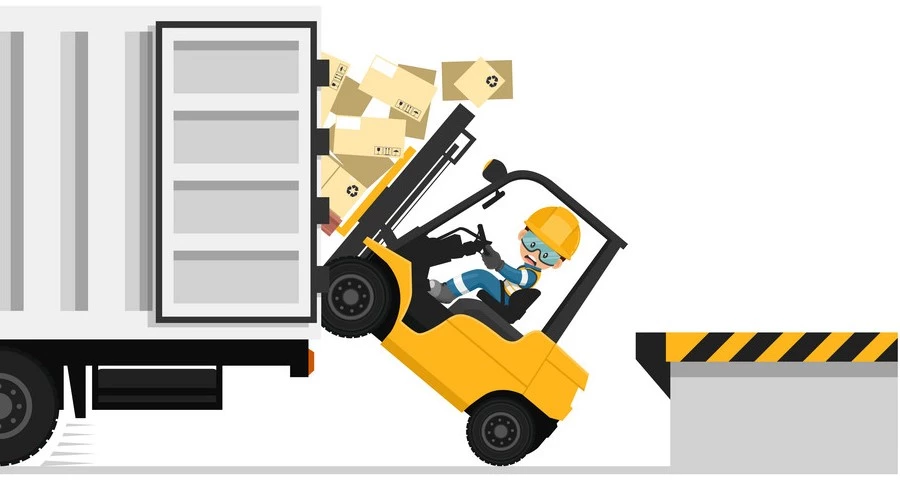
Thanks to forklifts, anyone can now quickly lift and transport heavy items such as pallets of products. They are a necessary element of equipment while moving logistics to a warehouse. These forklift trucks are designed to do this tough job without any trouble. They can lift heavy stuff and carry it from one place to another. This is super useful in places like construction sites and warehouses where there are very narrow aisle trucks and lots of heavy things to move around.
Think Forklifts are Easy? 9 Hidden Dangers That Could Cost You
Unfortunately, incidents involving negligence do
occur with heavy machinery, including inadequate training, faulty equipment,
and distracted driving that lead to vehicle collisions. For example, during a
highway construction project, a flagger directing traffic was run over by a
rough terrain forklift operator who did not realize the flagger was behind the
forklift (Occupational Safety and Health Administration (OSHA), 2018). In order
to address these typical human errors that can also lead to Human fatalities,
let’s understand cause of these errors.
Some common factors leading to these accidents are human
negligence, environmental uncertainties, mechanical, and problems related to
the load. Surprisingly most forklift accidents aren’t caused by mechanical or
load problems but due to behavioural factors where the forklift operator
"did not see" or "did not know" that someone or something
was nearby the forklift.
1. Improper Use: Despite using advanced forklifts, there are still some individuals who will misuse them. These include racing, making abrupt turns, and using the forklift in destructive ways, all of which can result in serious injuries and put other people in danger.
2. Blind spots: When a forklift is carrying a large, heavy object, the driver's view is obstructed, making it difficult for them to see directly ahead of them. In these situations, the operator should drive the forklift in reverse.
3. Insecure Files: Each forklift has distinctive fittings and a weight restriction. There should be no loose or unstable parts on the load; Anything loose could fall and cause serious injury to someone.
4. Lack of maintenance: A forklift need maintenance just like any other piece of machinery. Forklift risk exists in the absence of maintenance. When in use this equipment might get worn-out forks, faulty lights, broken alarms, or broken chains might pose a major risk.
5. Refilling fuel: Since recharging the forklift involves gas or other chemicals, the place where it is done can be quite dangerous. Both propane and diesel have a high potential for flames and explosions.
6. Speed: Because of the heavy loads, forklifts are capable of causing as much damage even at medium speeds as a car traveling at fifteen miles per hour. Anyone strolling around may be extremely risky due to the forklift's weight and speed.
7. Improper ceilings: Things dangling from above or low ceilings can lead to a dangerous situation. It might run into whatever the forklift is carrying, or it might not fit, leading to other issues.
8. Tethers and seatbelts: The tethers or seatbelts that encircle the forklift operator need to be kept in good working order at all times. This can jeopardize the operator's life if they are excessively loose or worn out.
9. Flooring conditions: Uneven floors or other places that have not been fitted correctly may cause damage to the forklift. Wet and slippery surfaces, cluttered with debris could cause problems for the forklift.
Zero Forklift Mishaps: From Blind Spots to Breakdowns, We've
Got You Covered.
Here are some safety guidelines you should strictly implement
in your warehouse:
Moreover, nowadays smart warehouses are
implementing a variety of immersive reality solutions, including as virtual
reality training for forklifts and augmented reality, to address these frequent
human errors that could result in human fatalities. Virtual reality is an
excellent technique for managing heavy machinery. The Warehouse Simulation is
taken into consideration in the VR technology design as an initial approach,
with more to come in many application sectors.
And to address the mechanical and repair issues you
can partners with 13SQFT-
your one stop solution for all spaces, infrastructure, automation and
technological needs. 13SQFT can
assist with forklift maintenance, flooring, and safety equipment. To ensure
safety, warehouses should have strict guidelines like trained operators,
regular inspections, and proper speed limits.
POSTED BY
Dikshita Jain
International Master In Business